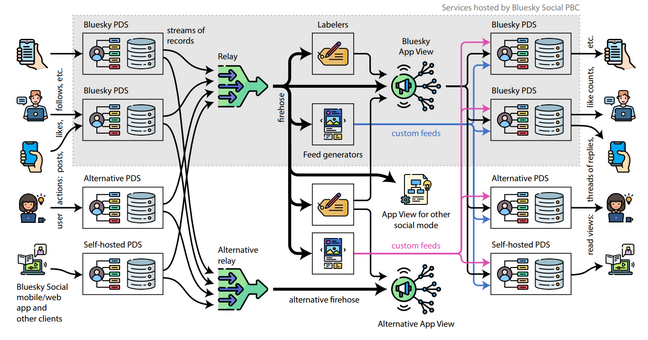In a challenge to billionaire-controlled social media platforms, a group of nine less affluent technology leaders have formed a group that aims to raise $30 million to support the development of decentralized social media platforms.
“We are former Twitter users who cherished the platform and the communities we built there over the years,” wrote the nine “custodians” of the collective, called Free Our Feeds. “However, we’ve also seen the quality of our feeds decline as one person took over what we had believed to be a global public square, using it for his own political and business objectives.”
That’s a reference to Elon Musk, who acquired Twitter in October 2022, renamed it X, and turned the social network into his personal amplification platform. The Free Our Feeds site also mentions Mark Zuckerberg, CEO of the Meta social media portfolio (Facebook, Instagram, WhatsApp, and Threads), whom they accused of “going full Musk last week” with his decision to dial back on fact checking and loosening of moderation rules.
Free Our Feeds intends to launch a public interest foundation to support the Authenticated Transfer Protocol, the decentralized networking technology that underpins the Bluesky social network, which rivals X and Threads.
The protocol aims to make it hard for a single entity to control content that users of a social network can see, by breaking down social services into three components: Personal Data Servers (PDS), which store account data including people’s posts; Relays, which gather and transmit that data; and App Views, which organize this data so it can be viewed in apps.
Operators of App Views can choose what content to index, effectively filtering or moderating the content distributed by Relays from PDS. Multiple App Views can exist in a network, so if you don’t like how one app works, look for or build an alternative.
The workings of those components are explained in a paper penned by academics and Bluesky folk, titled: “Bluesky and the AT Protocol: Usable Decentralized Social Media.”

Diagram from Kleppmann et al on the architecture AT Protocol-based networks, with Bluesky as an example .. Click to enlarge
The document points out that Bluesky is a Twitter-like app that runs atop the AT Protocol – but that the protocol could be adapted to run other social services that allow persistent access to content as well as online identities. Users could therefore participate in multiple communities of different sorts – a blog, a forum, and a book review site – with the same handle and the same dataset recording their activities. Users could also choose and switch between any provider of a PDS, Relay, or App Views.
As mentioned above, in theory that means that if you sign up to a provider of a social service powered by AT Protocol and decide you don’t like indexing decisions taken by the operator of an App View service, you could switch to another without any disruption or data loss – and enjoy a different view in another app that suits your preferences.
Anyone who cares to can run a PDS, Relay, or App View service. And as the paper explains: “If Bluesky Social PBC goes out of business or loses users’ trust, other providers can step in to provide an equivalent service using the same dataset and the same protocols.”
All of which sounds great, save for two snags: Relays are a big workload, and only Bluesky runs a relay today.
Free Our Feeds therefore plans to build a second Relay because the existence of one not operated by Bluesky is essential if the notion of decentralization is to mean anything.
Finally, the group plans to fund developers so they’ll build more applications on top of the AT Protocol.
The org’s initial ask is $4 million, currently sought with a GoFundMe. Those funds are flagged as necessary “to create the foundation and get critical infrastructure up and running so that we’re not dependent on billionaires.”
Free Our Feeds is overseen by these nine: Nabiha Syed, executive director at Mozilla Foundation; Robin Berjon, independent technologist; Mark Surman, president at Mozilla Foundation; Mallory Knodel, executive director at Social Web Foundation; Eli Pariser, co-founder of Avaaz; Phil Beaudoin, entrepreneur; Marc Faddoul, co-founder of AI Forensics; Deepti Doshi, co-director at New_ Public; and Sherif Elsayed-Ali, executive director at Future of Technology Institute.
And the group arrives with endorsements from a set of celebrities, academics, entrepreneurs, politicians, journalists, and activists, including Wikipedia founder Jimmy Wales, Harvard Business School Professor Emerita Shoshana Zuboff, Incredible Hulk actor Mark Ruffalo, and activist and author Cory Doctorow.
Free Our Feeds says that while it has been in contact with Bluesky, which supports its aim to expand the AT Protocol ecosystem, the organization is independent from Bluesky.
“Bluesky is built on values we share, by people we admire,” the group wrote. “However, founders are not companies. They will come under the same pressure all businesses face to maximize return to their investors – and, as we have seen, their leadership can change in the long term. To make the vision we share with Bluesky a reality, there needs to be alternative options for users to choose from in the first place backed up by independent infrastructure.”
The foundation, which plans to launch by the end of 2025, doesn’t yet have a name. Until then, donated funds will be administered by Development Gateway, a US-based 501(c)(3). At the time this story was filed, more than $11,000 had been pledged.
Coincidentally on Monday, Eugen Rochko, founder of the Mastodon decentralized social media ecosystem based on the ActivityPub protocol that AT Protocol’s authors believe they have surpassed, announced plans to form a new non-profit organization to “[affirm] the intent that Mastodon should not be owned or controlled by a single individual.” ®







